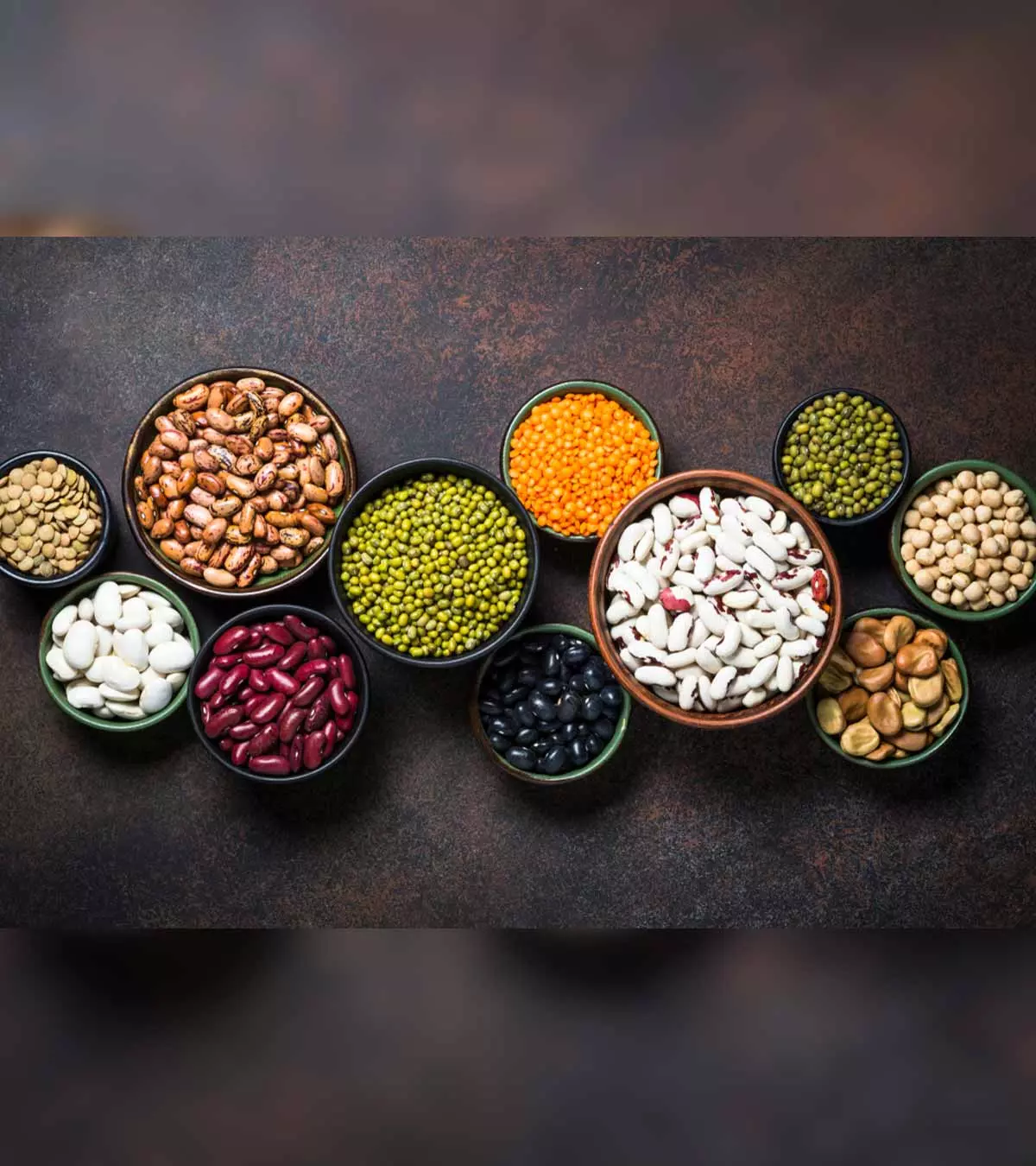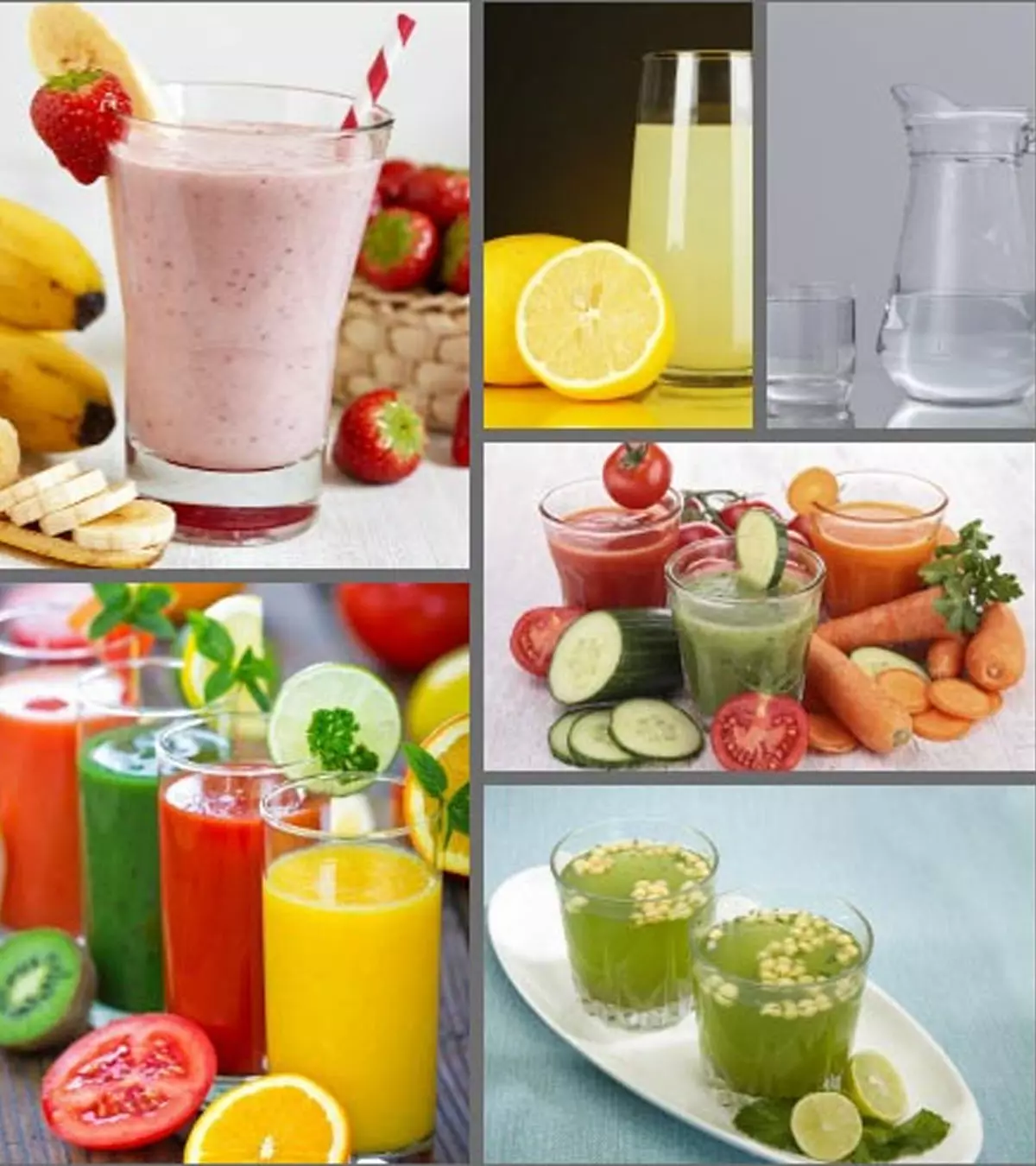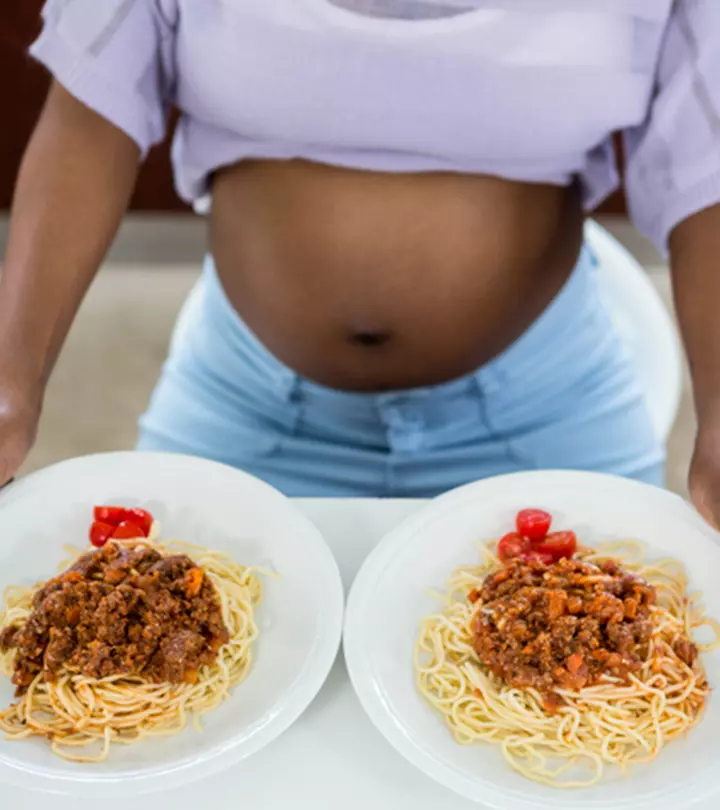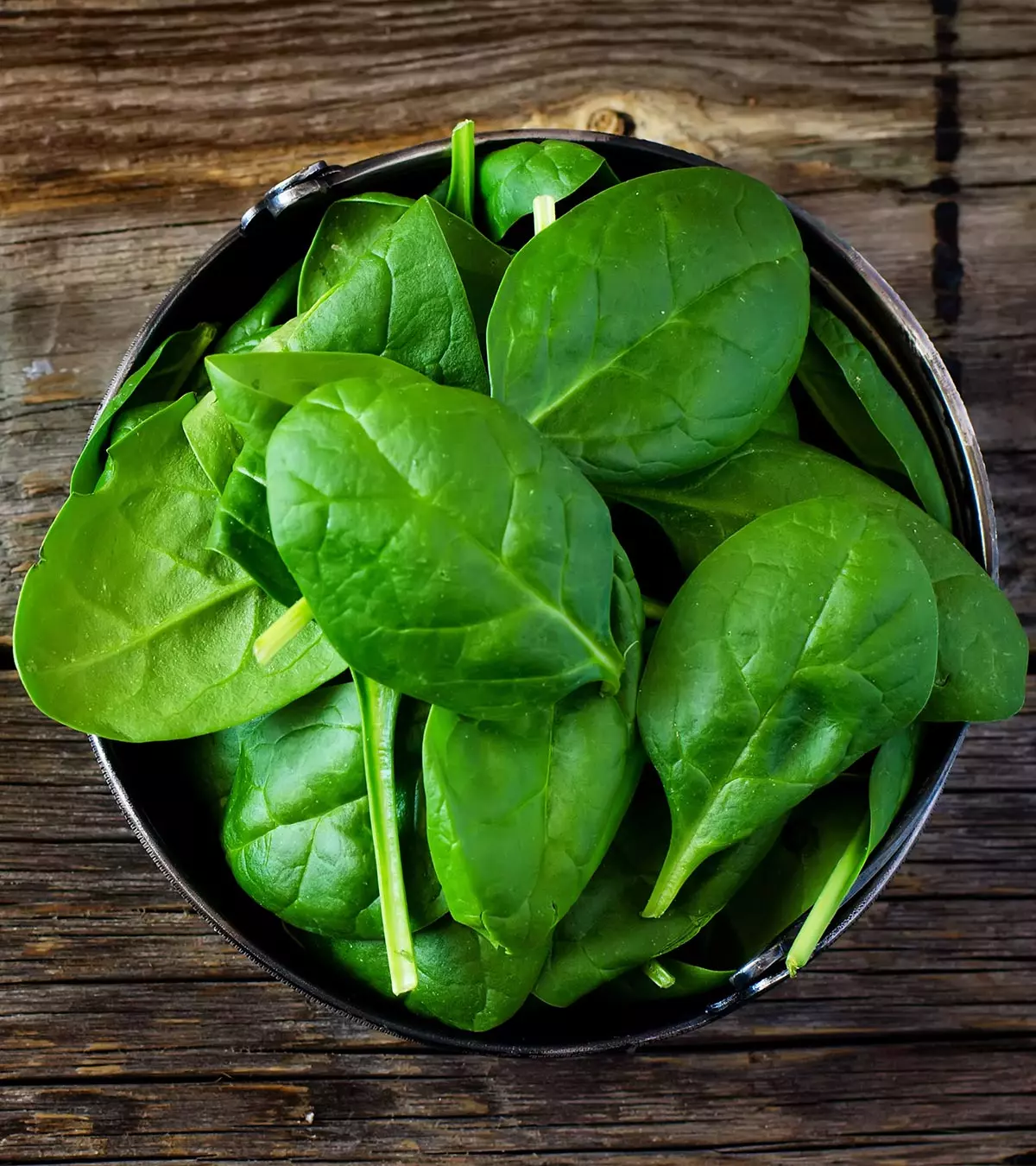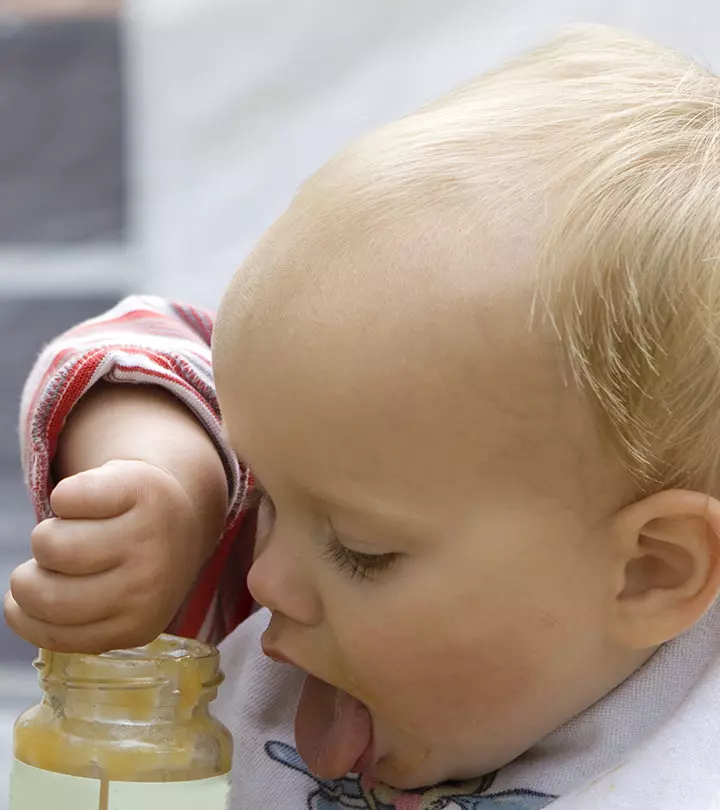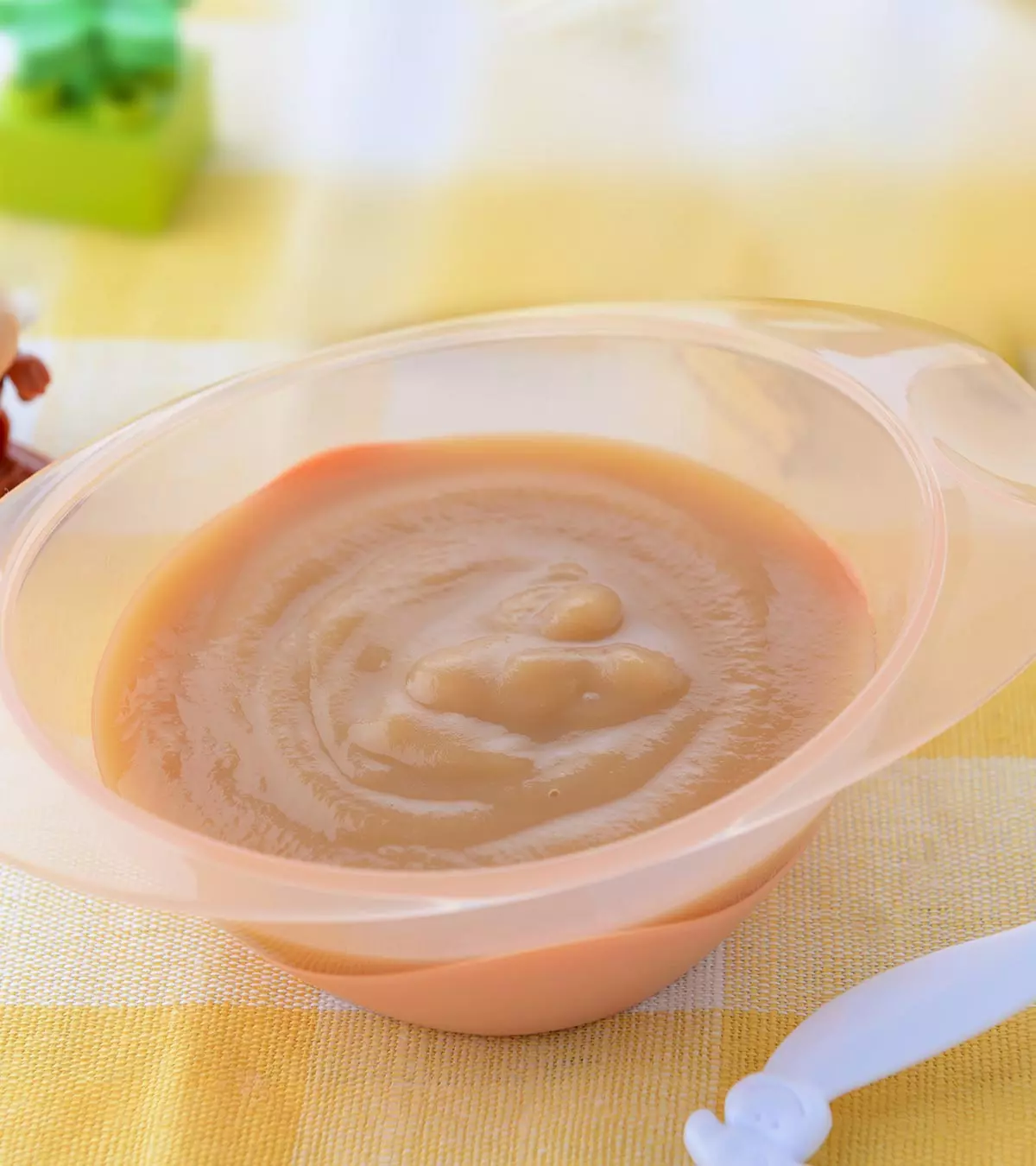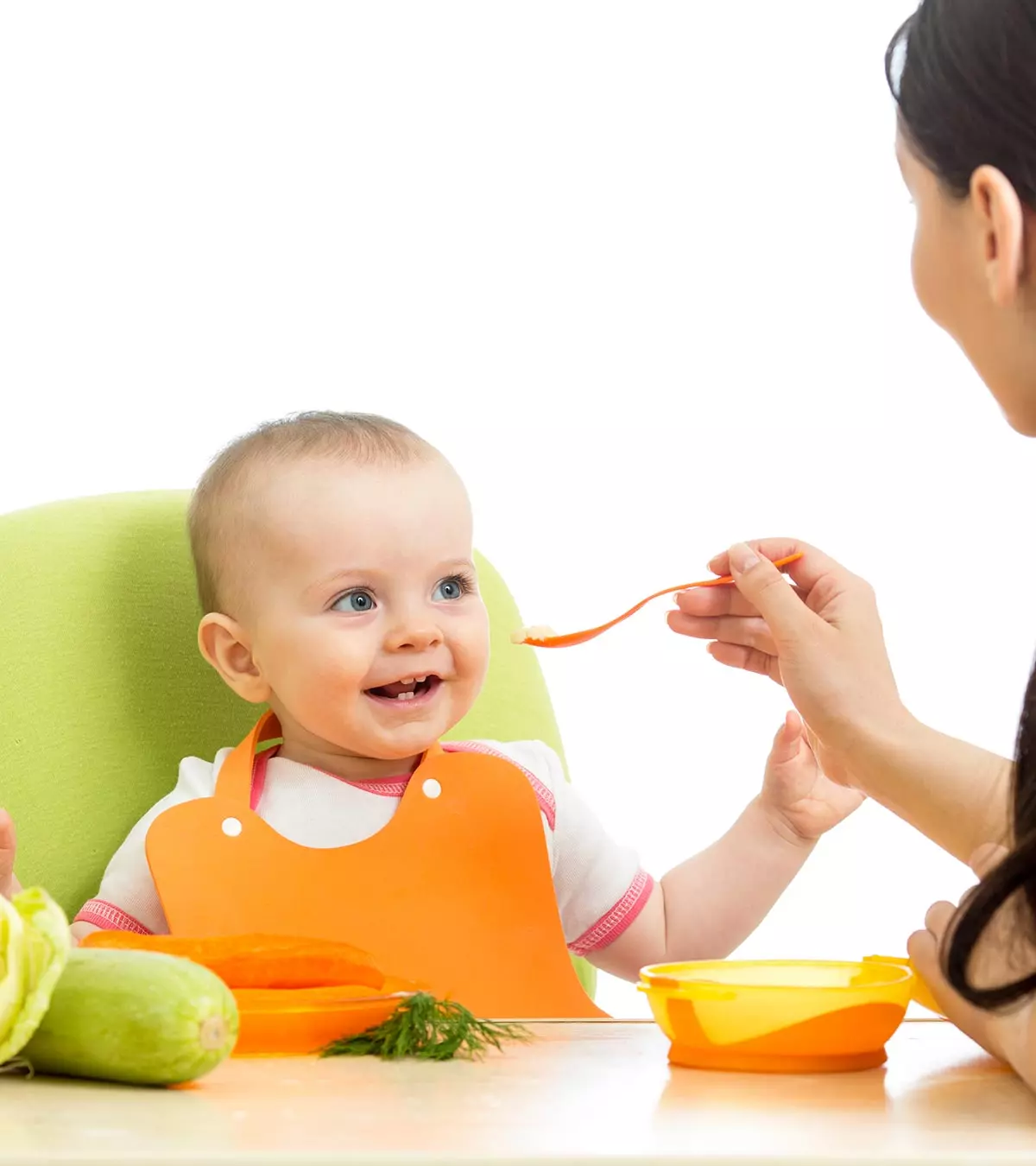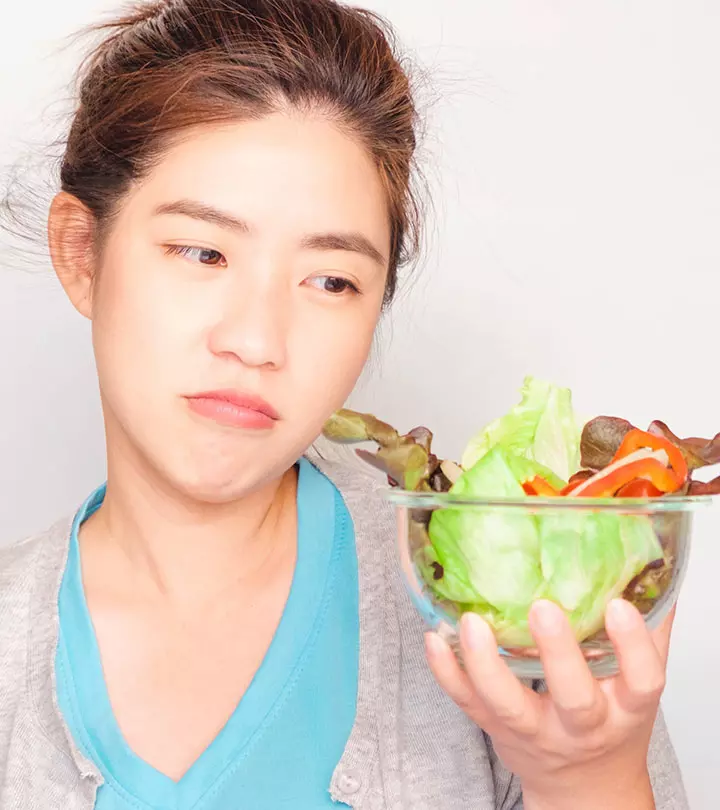
Image: Shutterstock
Appetite loss during pregnancy is common. Nausea, food aversion, and several other pregnancy-related food issues may occur in women during this time, making them eat less than the recommended proportions (1). Although appetite loss subsides mostly by the end of the first trimester, contact your doctor if it persists or worsens. Poor appetite during pregnancy might cause malnourishment in the developing fetus and adversely affect the mother’s health. Understanding the reasons and solutions can help manage your dietary needs and support a healthy pregnancy. Read on to learn about the causes and complications of loss of appetite during pregnancy and ways that may help fulfill your nutritional needs.
Key Pointers
- The reasons for losing appetite during pregnancy may vary with each trimester.
- Nausea, vomiting, morning sickness, and growing uterus can be some reasons.
- Consuming small and frequent meals, choosing healthy options, identifying foods that cause nausea could help you meet the nutritional demands.
Reasons For Appetite Loss During First Trimester
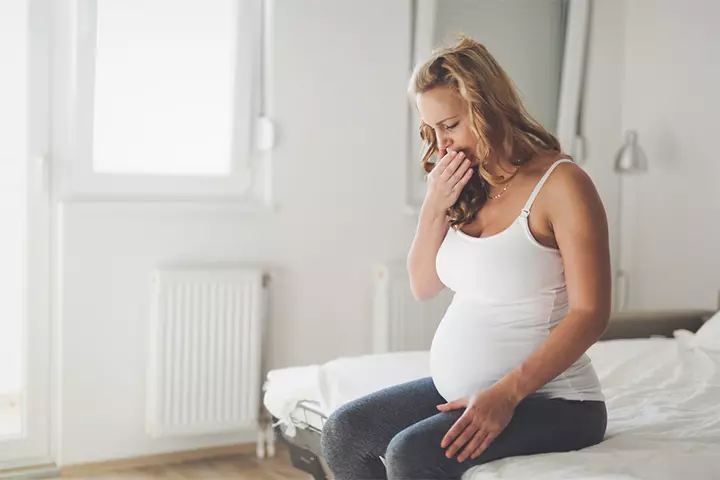
Morning sickness, nausea, and vomiting are the main reasons women have less or no appetite during pregnancy in the first trimester. According to the UK National Childbirth Trust (NCT), 50 to 80 percent of expecting mothers experience them early in pregnancy (2). A study report states, “Among 3,623 pregnant women, the cumulative incidence of nausea, vomiting or poor appetite was 49.5% (n = 1793) throughout pregnancy and 60.6% (n = 731) in the first trimester (3).”
Additionally, sensitivity to strong smells and the development of a metallic taste in the mouth are other reasons for food aversion, leading to appetite reduction. Fluctuation in pregnancy hormone levels (leptiniA hormone released by the adipose tissue or body fat, leptin’s primary function is to maintain the body weight for the long term. and human chorionic gonadotropin (hCG)) is another possible cause (4).
Nurul Ali, a mom, shares how morning sickness during pregnancy affected her appetite. She says, “I still remember that very night when I felt the first signs of nausea. My parents had bought me supper, and I just couldn’t get myself out of bed. Strangely, I didn’t feel like I could down any food at the time. Within the next few days, lethargy hit me hard, and my appetite deteriorated… Have to admit, I recalled feeling a small percentage of happiness for the fact that I was having morning sickness because it signified my pregnancy! (i).”
Pre-existing disordered eating can be another reason for a woman not eating enough during pregnancy. Pregnancy and its related discomforts may exacerbate an eating disorder such as anorexia nervosa (intense calorie restriction due to eating very low amounts or exercising too much). Weight gain and changes in body shape may also trigger anorexia. Women with eating disorders may have an increased risk for stillbirth, premature delivery, having low birth weight babies, and difficulty while breastfeeding (3) (4)
Generally, reduced appetite in the first trimester doesn’t affect the health of the mother or the baby. However, in severe cases, it can lead to adverse outcomes. For instance, a mother with hyperemesis gravidarumiIt is a term used to describe the persistent and extreme form of vomiting and nausea in pregnant women. It can cause dizziness and dehydration. (HG) can experience persistent and severe pregnancy-related nausea and vomiting, leading to a lack of appetite, dehydration, and electrolyte imbalances (7). So, what can you do to ensure that you and your growing fetus get optimum nourishment?
 Point to consider
Point to considerTips To Meet The Nutritional Needs In The First Trimester
Here are some practical tips to ensure you get the nutrients you need for a healthy pregnancy (9) (10).
- Have small frequent meals: Frequent vomiting or nausea can cause severe food aversion and decreased hunger. If you are facing this issue, don’t force-feed yourself. Instead, break your three big meals (breakfast, lunch, and dinner) into four to five smaller meals and eat at regular intervals. This way, the amount of food you eat in a meal is much less, which helps keep the food down in the stomach. Also, eating smaller portions of food at regular intervals helps keep your blood sugar levels in good control.
Note: If the appetite loss is due to disordered eating, you may try drinking protein shakes when you cannot eat healthy meals or snacks. However, do not use protein shakes to replace meals. Instead, use them to get consistent nourishment (5).
- Make healthy choices: Whenever you feel hungry during the day, eat healthy, easily digestible foods, such as bananas, unsweetened yogurts or smoothies, and whole-grain crackers. Eating healthy foods containing plenty of protein, fiber, and other essential nutrients ensures you and your baby get sufficient nourishment.
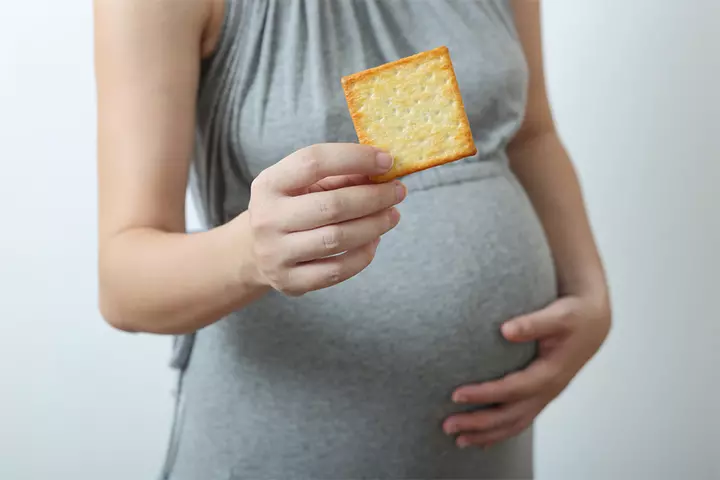
- Stay hydrated: Drink plenty of water and other fluids to keep yourself hydrated. It’s vital to fight dehydration that can occur due to reduced food intake. So, drink unsweetened, homemade lemonade, smoothies, and vegetable juices. Coconut water, buttermilk, and infused water are other fluids you can consume in between meals to ensure you get nutrients even if you don’t have sufficient food intake.
- Avoid foods with a strong smell: If you can’t stand the smell of your favorite food now, you aren’t alone. Food aversion due to a particular smell is fairly common in early and also later stages of pregnancy in some cases. If the smell of a particular food is bothering you, try masking its smell with other aromatic foods or herbs.
- Consume prenatal vitamins: Take your prenatal vitamins daily. If you have any insufficiency or deficiency, pay special attention to consuming supplements. Talk to your doctor to know if you need any additional vitamins or minerals. You may consult a nutritionist to make a well-balanced and personalized meal plan suited to your appetite.

Besides, seek prompt medical guidance if you cannot eat or experience symptoms like weight loss or fatigue. Your healthcare professional may prescribe medicines that can reduce nausea or vomiting and help regain your appetite.
Lindsey, a mother and a blogger, shares her experience dealing with nausea and appetite loss in the first trimester. She says, “My method for managing: sip juice, eat some crackers while still in bed, sit and stand up slowly and drink instant breakfast on the way to work, if not before. The instant breakfast was great because with no appetite to prepare, chew and swallow actual food in the morning, the chocolate milk went down easy and gave me the start I needed (ii).”
Note: Chronic appetite loss can cause undernutrition, leading to a higher risk of poor fetal growth, low birth weight, and preterm labor (3).
Reasons For Appetite Loss During Second Trimester
Most women overcome nausea and vomiting by the 14th week of pregnancy (11). However, it may continue for a few more months or until the end of pregnancy for some women. Then, several women experience reduced appetite due to their growing bellies, which press on their stomachs, making them feel full quickly. Rising progesterone levels is another issue that may reduce appetite by making the gastrointestinal movement sluggish and slowing down digestion (12). Mental health conditions, such as anxiety and prenatal depression, may also affect appetite (13).
According to research, depression may reduce one’s appetite, especially for healthy food, and increase intake of unhealthy foods (14). Poor diet quality can affect the mother and her unborn baby’s health. Hence, if you feel anxious or depressed, contact your healthcare provider. Don’t shy away from opening up about mental health blues. Instead, get them treated so that they don’t affect your eating habits negatively.
 Research finds
Research findsTips To Meet The Nutritional Needs In The Second Trimester
If you are in your second trimester and still have appetite issues, adhere to your first trimester rituals. In addition, pay attention to specific nutrients that will support your baby’s rapid growth and development during this trimester (16) (17).
- Calcium: You need 1000 micrograms (mcg) of calcium per day during pregnancy. The body needs calcium to regulate body fluids and support the growth and development of your baby’s bones and teeth.
- Protein: Pregnant women need 71g of protein per day. They require more protein to increase blood supply during pregnancy. Additionally, they need extra protein to support the breast and uterine tissuesiThe uterus has three tissue layers, namely the endometrium, the innermost layer that takes part in menstruation and reproduction; myometrium, or the muscle layer; and the perimetrium, the thin outer layer. growth and fetal brain development.
- Folate: Women need 600 micrograms (mcg) of folate daily. This micronutrient is required for the development of the baby’s healthy nervous system. Also, it reduces the risk of neural tube defects, such as spina bifidaiIt is a congenital neural tube defect where the baby’s spinal cord does not form properly. .
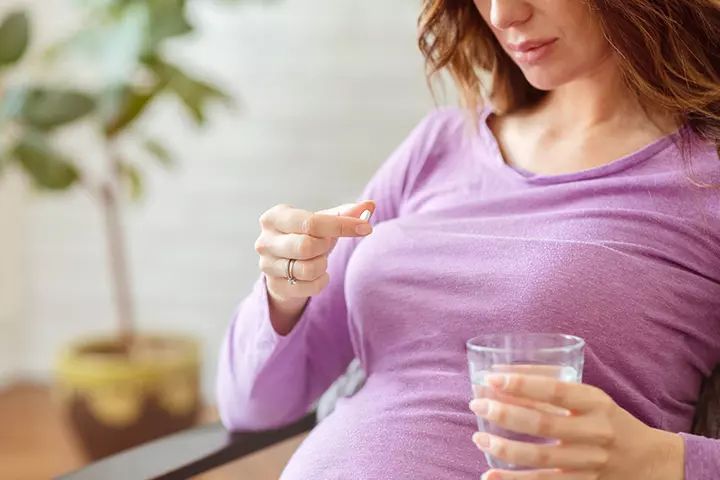
- Iron: Blood volume during pregnancy increases. It happens because your body is making blood for you and your baby. Hence, expecting mothers require 27mg of iron daily.
Besides these, focus on your Omega-3 and Vitamin C intake during pregnancy. You need Omega-3 fats for the healthy development of your baby’s heart, eye, and brain. On the other hand, Vitamin C is vital for facilitating several physiological functions, including your baby’s tooth and bone development.
Reasons For Appetite Loss During Third Trimester
Most pregnant women do not experience nausea and vomiting in the third trimester. Therefore, there is no true appetite loss in the third trimester. However, the growing tummy in the third trimester causes laborious breathing, making eating uncomfortable. Women also experience slow digestion, pregnancy-induced heartburn (acid refluxiIt is also called gastric reflux and is a condition where stomach acid flows back into the esophagus (food pipe), causing chest pain. ), and constipation in the third trimester, hampering their appetite further.
Obstetrician and gynecologist Dr. Himali Maniar Patel says, “If appetite loss becomes overwhelming or persistent, try focusing on small portions of nutrient-dense foods, such as smoothies with leafy greens, protein, and fruit, or nutrient-rich broths, which are easier on the stomach but packed with essential nutrients.”
Tips To Meet The Nutritional Needs In The Third Trimester
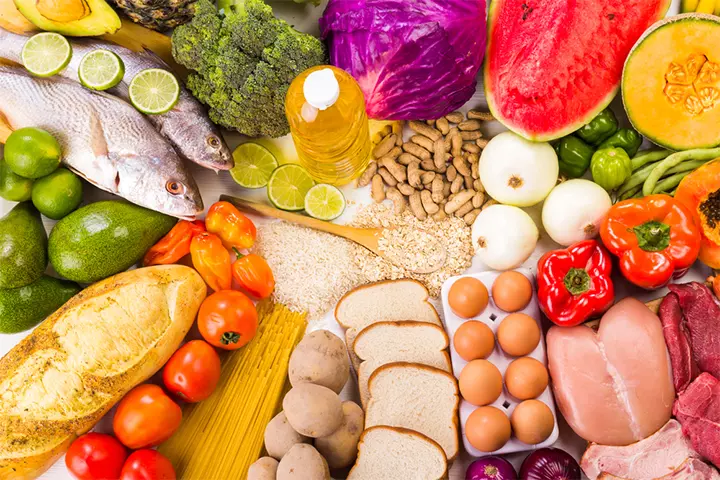
Adhere to healthy eating and active lifestyle practices even in the last trimester. Focus on the following steps in particular to fight digestive issues, such as heartburn and constipation (18):
- Eat small portions of food at regular intervals
- Consume high-protein, high-fiber foods from different food groups
- Drink plenty of water and fluids
- Stand and eat if you find it inconvenient to sit while eating
 Point to consider
Point to considerIf a pregnant woman experiences ongoing appetite loss, it can lead to poor nutrition, which may harm both her health and the baby’s development. In severe cases, it can increase the risk of neurodevelopmental delays in the fetus (20). If left unaddressed, it may also result in complications such as low birth weight, premature birth, and poor growth in the womb (3). If appetite issues continue for more than a week or come with symptoms like dehydration, noticeable weight loss, or extreme fatigue, seeking medical advice is essential (21). Early medical intervention can help prevent serious complications and support a healthy pregnancy.
Frequently Asked Questions
1. Can not eating enough cause miscarriage?
Studies indicate that not eating enough may create nutritional deficiencies in your body. If this becomes severe, it may increase the risk of spontaneous abortion (22).
2. What should my appetite be like in early pregnancy?
Women may have different experiences with appetite in early pregnancy. Some may develop strong food cravings during pregnancy or feel constantly hungry, while others may face food aversions and a reduced appetite (mostly due to morning sickness). Taste preferences may also change (23).
3. How long can I go without eating during pregnancy?
Generally, it is recommended to have three small and balanced meals and three snacks a day during pregnancy (24). So, it is advisable not to go more than two to three hours without eating.
Expectant mothers may experience a loss of appetite due to various body and hormonal changes in pregnancy. The reasons for appetite loss in pregnancy may be different in each trimester and include morning sickness, vomiting, depression, having unhealthy food, and nausea. You may have small, frequent meals, drink plenty of water, eat protein and fiber-rich foods, and pay attention to specific nutrients to meet the nutritional needs in the first trimester. Appetite loss can be temporary and harmless. However, consult your doctor if it persists.
Infographic: Pregnancy Smoothies To Cope With Morning Sickness
Morning sickness is a significant cause of reduced appetite during pregnancy. Adding ingredients that alleviate nausea and vomiting in your pregnancy diet can help improve your appetite. This can be efficiently done through yummy smoothies. The infographic below lists some delicious smoothie recipes to help you cope with the situation. Illustration: Momjunction Design Team
Illustration: Tips To Deal With Appetite Loss During Pregnancy
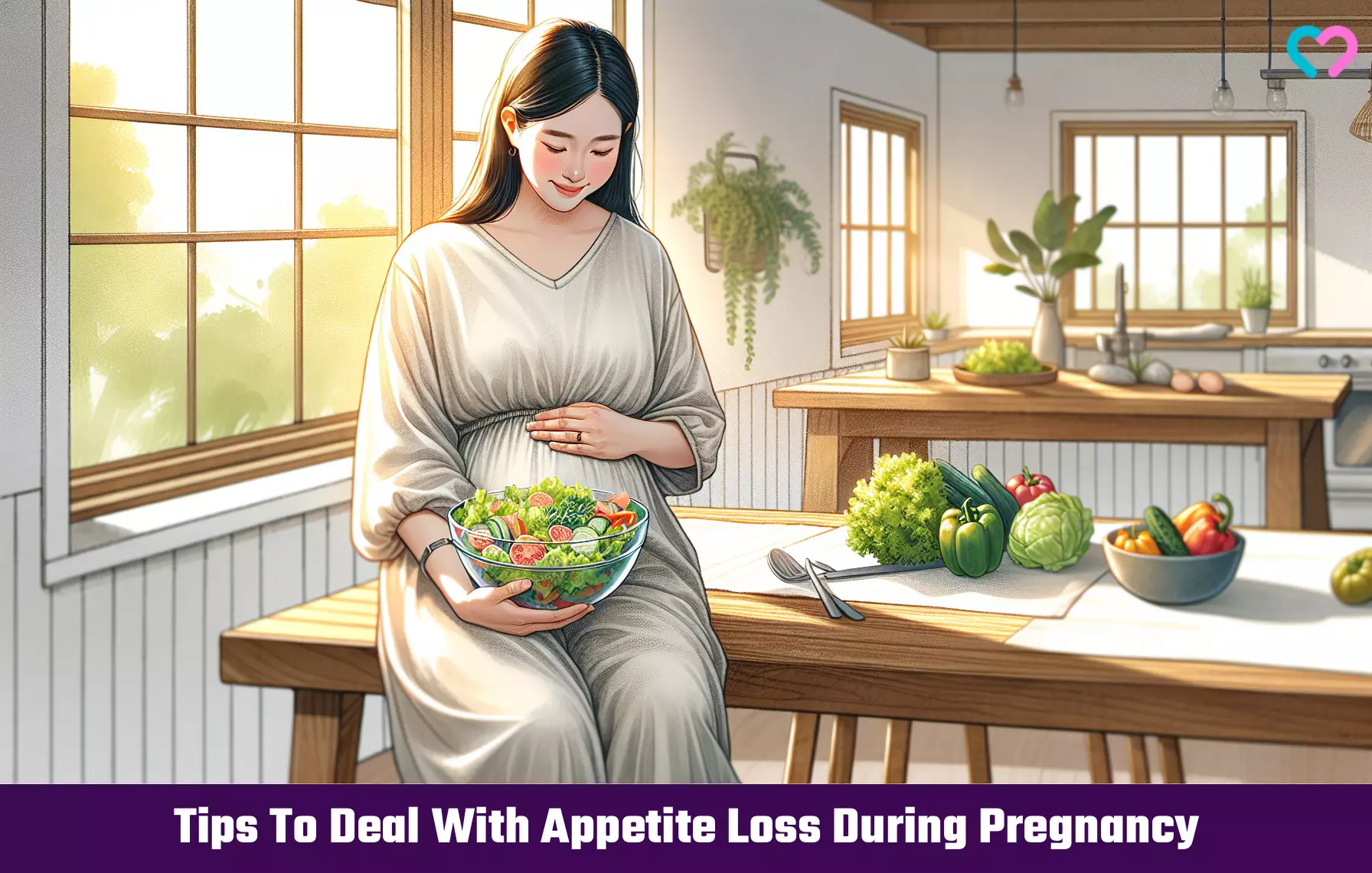
Image: Dall·E/MomJunction Design Team
Personal Experience: Source
MomJunction articles include first-hand experiences to provide you with better insights through real-life narratives. Here are the sources of personal accounts referenced in this article.
i. My pregnancy journey: Morning sickness.https://dellaire.wordpress.com/2016/04/18/my-pregnancy-journey-morning-sickness/# ii. The Pregnancy Process- TMI ahead.
https://familystyleliving.wordpress.com/2013/11/21/the-pregnancy-process-tmi-ahead/
References
- Appetite changes and food aversions during pregnancy.
https://www.pregnancybirthbaby.org.au/appetite-changes-and-food-aversions-during-pregnancy - Am I pregnant? Early signs and symptoms.
https://www.nct.org.uk/information/pregnancy/body-pregnancy/am-i-pregnant-early-signs-and-symptoms - Amanda Regodón Wallin et.al; (2020); Nausea, vomiting and poor appetite during pregnancy and adverse birth outcomes in rural Nepal: an observational cohort study.
https://pmc.ncbi.nlm.nih.gov/articles/PMC7499900/ - Noel M Lee and Sumona Saha; (2013); Nausea and Vomiting of Pregnancy.
https://pmc.ncbi.nlm.nih.gov/articles/PMC3676933/ - Managing pregnancy when mom has an eating disorder.
https://utswmed.org/medblog/pregnancy-eating-disorder-anorexia/ - Eating disorders in pregnancy.
https://www.nct.org.uk/information/pregnancy/body-pregnancy/eating-pregnancy-and-after-birth - Hyperemesis gravidarum.
https://medlineplus.gov/ency/article/001499.htm - Lisa M Bodnar et.al; (2006); Treatment With Selective Serotonin Reuptake Inhibitors During Pregnancy: Deceleration of Weight Gain Because of Depression or Drug?
https://pmc.ncbi.nlm.nih.gov/articles/PMC4291021/ - Vomiting and morning sickness.
https://www.nhs.uk/pregnancy/related-conditions/common-symptoms/vomiting-and-morning-sickness/#:~:text=get%20plenty%20of%20rest%20(tiredness - Pregnancy and diet.
https://www.betterhealth.vic.gov.au/health/healthyliving/pregnancy-and-diet - Morning Sickness: Nausea and Vomiting of Pregnancy.
https://www.acog.org/womens-health/faqs/morning-sickness-nausea-and-vomiting-of-pregnancy - Pregnancy: How Your Digestion Changes.
https://www.urmc.rochester.edu/encyclopedia/content?contenttypeid=90&contentid=p09521#:~:text=The%20hormone%20progesterone%2C%20which%20causes - Prenatal Depression.
https://my.clevelandclinic.org/health/diseases/22984-prenatal-depression - T S Sathyanarayana Rao et.al; (2008); Understanding nutrition, depression and mental illnesses.
https://pmc.ncbi.nlm.nih.gov/articles/PMC2738337/ - Ayesha Saeed et.al; (2016); Effect of antenatal depression on maternal dietary intake and neonatal outcome: a prospective cohort.
https://pmc.ncbi.nlm.nih.gov/articles/PMC4939634/ - Pregnancy Nutrition.
https://americanpregnancy.org/healthy-pregnancy/pregnancy-health-wellness/pregnancy-nutrition/ - Linda G Snetselaar et.al; (2021); Dietary Guidelines for Americans, 2020–2025.
https://pmc.ncbi.nlm.nih.gov/articles/PMC8713704/ - YOUR GUIDE TO-Healthy Pregnancy.
https://my.clevelandclinic.org/-/scassets/files/org/obgyn/healthy-pregnancy-guide-20.pdf - Gastrointestinal Issues During Pregnancy.
https://www.brownhealth.org/centers-services/multidisciplinary-obstetric-medicine-service-moms/gi-issues-pregnancy - Malnutrition & Dehydration.
https://www.hyperemesis.org/about-hyperemesis-gravidarum/complications/malnutrition-dehydration/ - Loss of Appetite.
https://my.clevelandclinic.org/health/symptoms/24228-loss-of-appetite - Rahimeh Ahmadi et.al; (2016); Association between Nutritional Status with Spontaneous Abortion.
https://pmc.ncbi.nlm.nih.gov/articles/PMC5134748/ - Am I Pregnant?
https://my.clevelandclinic.org/health/articles/9709-pregnancy-am-i-pregnant - Diet During Pregnancy.
https://americanpregnancy.org/healthy-pregnancy/pregnancy-health-wellness/diet-during-pregnancy/#
Community Experiences
Join the conversation and become a part of our nurturing community! Share your stories, experiences, and insights to connect with fellow parents.
Read full bio of Dr. Ng Kai Lyn
- Dr. Himali M Patel is an Ahmedabad, India based gynecologist with 13 years of experience. She currently practices at Nisha Women's Hospital and IVF Centre. Dr. Patel did her graduation in Medicine at Bharati Vidyapeeth University, Pune and holds a diploma in Obstetrics and Gynecology.
 Dr. Himali M Patel is an Ahmedabad, India based gynecologist with 13 years of experience. She currently practices at Nisha Women's Hospital and IVF Centre. Dr. Patel did her graduation in Medicine at Bharati Vidyapeeth University, Pune and holds a diploma in Obstetrics and Gynecology.
Dr. Himali M Patel is an Ahmedabad, India based gynecologist with 13 years of experience. She currently practices at Nisha Women's Hospital and IVF Centre. Dr. Patel did her graduation in Medicine at Bharati Vidyapeeth University, Pune and holds a diploma in Obstetrics and Gynecology.
Read full bio of Swati Patwal
Read full bio of Rebecca Malachi
Read full bio of Aneesha Amonz







